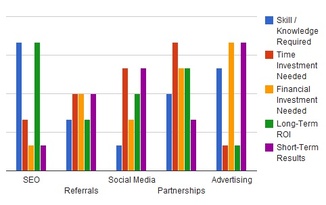
In Social Media Marketing the story length of what you want to sell may sound like a trivial concern, but believe it or not, it’s one of the most hotly debated topics in the sphere of online brand management services.
On average, most article submission sites set the minimum word count at 500 words, but there’s no cap. I know a SEO agency that can rally behind the battle cry behind “the longer the better”... my SEO services advocate for conciseness and brevity. Less talk, less mistakes.
Qualifying what “better” means To say that one thing is better than the other, there should be a set of criteria to quantify or qualify the claim. When it comes to the duel between short articles and long articles, some of the questions an SEO agency should ask are:
The reason that this big enigma in brand management services is still being discussed is because no one can present irrefutable proof that a short article would outperform a long article and vice versa.
Content first before length
The reality is, the safest and probably most accurate settlement for this standoff is “it depends.” Specific topics, in order to serve the best information to an audience, needs to be explained lengthily. These are topics that have numerous dimensions and to omit even one will undermine the credibility and reliability of the material.
On the flipside, there are topics that do not need to be belabored if you can already present a case in just 500 words. Or even less for that matter. The fact is, it’s up to the discretion of the content experts in an SEO agency to determine whether an article should be in-depth and detailed or short and sweet.
It’s all about what the readers need when someone goes online and runs a search, he or she already have pre-set expectations on how long an article should be.
IF YOU WANT HELP ABOUT THIS ISSUE, PLEASE ASK ME!
On average, most article submission sites set the minimum word count at 500 words, but there’s no cap. I know a SEO agency that can rally behind the battle cry behind “the longer the better”... my SEO services advocate for conciseness and brevity. Less talk, less mistakes.
Qualifying what “better” means To say that one thing is better than the other, there should be a set of criteria to quantify or qualify the claim. When it comes to the duel between short articles and long articles, some of the questions an SEO agency should ask are:
- Will a short article generate more click-through compared to a long one and vice versa?
- Does length actually impact the number of views your content gets?
- Does word count have a bearing in terms of SERP performance in Google?
- Does brevity or otherwise encourages more syndication?
The reason that this big enigma in brand management services is still being discussed is because no one can present irrefutable proof that a short article would outperform a long article and vice versa.
Content first before length
The reality is, the safest and probably most accurate settlement for this standoff is “it depends.” Specific topics, in order to serve the best information to an audience, needs to be explained lengthily. These are topics that have numerous dimensions and to omit even one will undermine the credibility and reliability of the material.
On the flipside, there are topics that do not need to be belabored if you can already present a case in just 500 words. Or even less for that matter. The fact is, it’s up to the discretion of the content experts in an SEO agency to determine whether an article should be in-depth and detailed or short and sweet.
It’s all about what the readers need when someone goes online and runs a search, he or she already have pre-set expectations on how long an article should be.
IF YOU WANT HELP ABOUT THIS ISSUE, PLEASE ASK ME!



 RSS Feed
RSS Feed